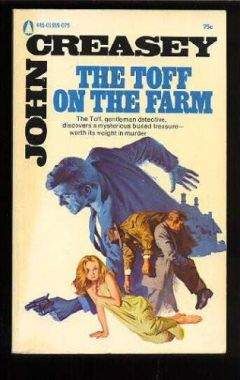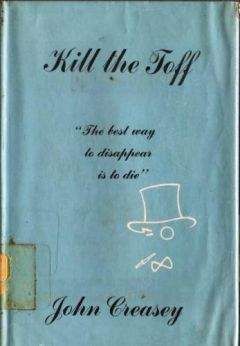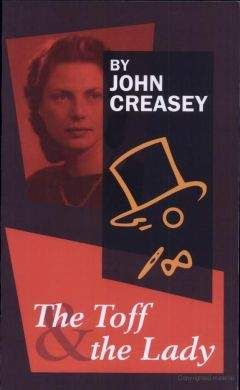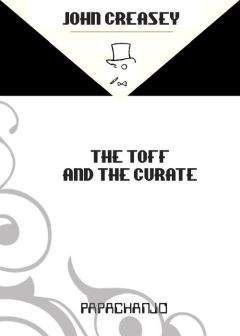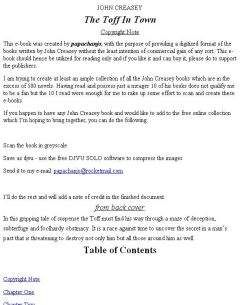John Creasey - Stars For The Toff
He saw his master and a tall, dark-haired young man; and he saw the gun in the young man’s hand. If he touched the trigger, there wouldn’t be a chance for Rollison.
Quite calmly, Jolly called:
“Excuse me, sir.”
On the instant the young man looked up, and Rollison drove his fist into the unprotected stomach. As the gun clattered to the floor, Rollison stopped the other from falling, and glanced up with a smile which Jolly would treasure for a very long time.
“Are you all right, sir?”
“Yes. Come and look after this chap, will you? Give me ten minutes or so, and then bring him up to the flat.”
“Certainly, sir.” Jolly hurried down the stairs and picked up the gun, and Rollison turned to his assailant. “Go upstairs with Jolly, and let the police think you’ve just come to see me. Don’t try any tricks or I’ll throw the book at you.” Bounding past Jolly and the stranger, he ran up the remaining stairs towards his flat.
Clay and two other men were standing in the hall, and Rollison beamed at them as if he hadn’t a trouble in the world.
“Won’t keep you long,” he said, and strode through to the living-room. In a moment he was leaning out of the window. As his head appeared there was another roar of cheering.
At last the crowd fell silent.
At last Rollison was able to make himself heard.
“I promise you that justice will be done to Madam Melinska and to Mona Lister. I promise you—”
It was as if everyone in the street went mad, the waving, the cheering, were so furious. Even when he had spoken to them five times, another roar for him came as fast as he could shut the window; but gradually the crowd grew silent, and the police filtered in and took complete control.
“Now what can I do to help you?” Rollison asked Chief Inspector Clay.
CHAPTER TWELVE
Friend Into Foe
Rollison looked blankly into Clay’s eyes, silently echoing “arrest.” Clay was hostile and in a way defiant. Slowly, Rollison began to relax; suddenly, he realised how lucky it was that he had left the stolen papers in the station locker; that was a break in a thousand. He saw the puzzlement in the Yard man’s eyes as he grinned.
“Well, well,” he said. “It’s quite a time since the Yard made that mistake. All right, officer, I’ll come quietly—but I’d like a couple of hours’ grace.”
“You’ll come with me, now.”
Rollison’s eyes were still laughing.
“Why not ask Grice for my grace?”
“Mr Grice is not concerned in this case.”
“He will be,” Rollison said. “Believe me, he will be. You know, this is the most remarkable tribute to Madam Melinska. She said my friends would become my foes, or words to that effect, but that I would get help from unexpected sources. I wonder where it will come from next. Chief Inspector—”
“I’m not here to talk,” Clay growled.
“No,” Rollison said. “Nor to slow down your rate of promotion.”
“If you’re threatening me—” Clay’s eyes flashed.
“Don’t be a fool, man,” Rollison said lightly. “Of course I’m not threatening you. But if you arrest me and the Court dismisses the case in the morning, won’t it count against you?” When Clay didn’t answer, Rollison went on: “You know damn well it would take years to live down. Yes, I realise you wouldn’t have got a warrant unless you thought it was justified, but events can make a clever man look foolish. What’s the charge?”
“Illegal entry.”
“What?”
“I needn’t keep saying it—the charge is illegal entry.”
“At Mrs Abbott’s?”
“Where else have you forced entry?” demanded Clay, sharply.
Rollison thought: “He certainly isn’t a fool.” He said: “So you’ll hold me on that for twenty-four hours and hope you can prove I murdered Mrs Abbott. Tell me, do you really believe I murdered her?”
Clay drew a deep breath.
“Mr Richard Rollison, it is my duty to—”
Rollison rasped: “Do you think I murdered Mrs Abbott?”
“That’s nothing to do with the matter in hand.”
Rollison thought: I can’t shift him, he’s as stubborn as a mule. They were staring at each other, hostility mutual now, until Rollison said abruptly: “May I make one telephone call?”
“Provided I know whom you’re calling.”
“My solicitor,” Rollison said shortly.
“Well—”
Clay was interrupted by a commotion at the front door, as Jolly came inside, ushering the stranger who had threatened Rollison on the stairs. Two detectives turned to Clay, not knowing what to do, as Jolly said in vexed tones:
“I’m sorry, sir, but this is Jones, who applied for the post as valet. Shall I interview him sir?”
Rollison nodded. “Yes, will you do that, Jolly? I may be out for a while.”
“Very well, sir. This way, Jones—” Jolly led the way to his quarters, the stranger followed bemusedly, and Clay appeared to be completely unsuspicious.
Rollison picked up the telephone and dialled a Temple Bar number. He could think of only one man who might be able to help him in this situation, a member of a firm of London solicitors with a big practice in criminal law. There was always the risk that the man he wanted would be out, but he concealed his uncertainty when a girl answered.
“Kemp, Davidson, Kemp and Davis.”
“Mr Roger Kemp, please—this is Richard Rollison.”
“Who—who, sir?” The girl’s voice rose. “Mr Rollison, the—the Toff?”
“That’s what they call me.”
“I’ll put you through, Mr Rollison, but I would like to say how wonderful it was of you to help Madam Melinska this morning. She is a remarkable woman, and no more guilty than I am, if you’ll forgive me saying so, sir . . . Here’s Mr Roger . . . Oh, Mr Roger, it’s the To—it’s Mr Rollison: A man with a very deep voice said: “That’s the first time in ten years I’ve ever known Betty say a word out of place, Rolly. What influence did you exert?”
“Astrological,” Rollison answered. “What—oh!” Kemp chuckled. “She’s a star-gazer too, is she? I didn’t know until this morning how many women were fooled by that nonsense. Want some help with the Madam Melinska case? You obviously need it.”
“Roger,” Rollison said, “I’m likely to be at Cannon Row in an hour or less on a charge of illegal entry. I want a hearing tonight—within the hour if possible. I’ve a lot to do and I can’t do it with this charge hanging over my head . . . Did I force entry? My dear fellow—you know damn well I didn’t . . . Well, there was a strong smell of burning and someone had to get into that place pretty quickly . . . My dear chap, the magistrate will dismiss the charge in sixty seconds flat—” Rollison did not so much as glance at Clay, but he was aware of the detective’s fixed, tense stare. “All I need is a quick hearing . . . You will? Good man! If I’m not at Cannon Row, presumably I’ll be at the Yard . . . Well, until I’m actually charged I suppose it’s no use getting the magistrate . . . hold on a minute, have a word with Chief Inspector Clay.”
He handed the telephone to Clay, who took it with obvious reluctance and hesitated. Then he covered the mouthpiece with the palm of his hand.
“Will you undertake to stay here while I refer to my superiors, Mr Rollison?”
“Provided I’m free to go out in a couple of hours,” Rollison agreed. Inwardly he exulted, outwardly he showed no sign at all of triumph. “Nothing I need more than a couple of hours rest, and I can see that chap Jones. I—”
Clay was saying to Kemp: “No, sir, there was a misunderstanding, I have not yet made the arrest, I’m going to refer to my superiors, sir . . . Yes, I fully understand.” He put down the receiver and looked at Rollison with some resentment. “I shall leave men outside, back and front,” he said warningly.
Rollison said quietly: “My word on it, I won’t leave here until I’ve heard from you. Will you do something for me at the Yard?”
“For you?” Clay was taken aback.
“I need to know all I can about Mrs Abbott, her late husband, their family, business and background. Now she’s been murdered you’ll have to check these points, and I think they might help me to clear Madam Melinska. Normally, Mr Grice would let me know anything which had no direct bearing on the case. Will you do so?”
Clay still looked startled. “I need to get permission.”
“I’ll be grateful if you will,” Rollison said.
Clay nodded, and turned away. Two minutes later he and his men had left the flat, Jolly appearing as if by magic as soon as the front door had closed on them.
“Is the man quite mad?” he demanded.
“Just over-zealous and convinced I’ve been treated too leniently for too long,” Rollison said. “They’ll hold off unless they get something much more specific. What’s your man got to say for himself?”
Jolly answered: “Not a word, sir.”
“Let me have a good look at him,” Rollison said, and added: “that valet idea was very clever.”
“Thank you, sir,” said Jolly, almost smugly. “It seemed one way to prevent the police from suspecting that we were keeping him prisoner. I’ll go and get him, sir—I locked him in the spare-room bathroom.”
The spare-room bathroom had a ventilator but no window.
Rollison moved to the living-room window and looked down, seeing Clay striding to his car, glancing neither right nor left. The crowds were beginning to disperse but there was still a large number of people in the street, and it passed through Rollison’s mind that they could quite easily have mobbed Clay had they known about the warrant.
Suddenly he heard Jolly call:
“Will you come here, sir?”
There was a note of alarm in his voice, and Rollison moved swiftly. Jolly appeared at the spare-room door.
“He’s unconscious, sir.”
“What?”
“It’s almost as if he—was asphyxiated, sir.”
Rollison said: “He can’t have been.” He thrust his way across the bedroom and into the bathroom, sniffing: the air was clear, there was no lack of oxygen. The stranger was sitting on the floor, head lolling on his chest, arms draped by his side. Rollison felt his pulse; it was steady enough, but faint. He hoisted him up and carried him into the spare room, laying him on the bed. Jolly had already loosened his collar and tie, and now Rollison gently pushed up one of his eyelids.
Jolly moved forward to peer at the pupil. “A pinpoint, sir!”
“Morphia,” Rollison said with relief. “He came prepared, didn’t he? Rather than answer questions he put himself to sleep. But he’ll wake up, Jolly. Go through his clothes, find out what he has in his pockets, and let me know. I’ve got some telephoning to do.”
* * *
“Madam Melinska is perfectly all right, Richard,” said Lady Hurst. “And has every confidence in you. I hope it isn’t misplaced.”
“So do I,” said Rollison earnestly. “Has Mona said anything?”
“I am afraid she is rather a sullen child. So many pretty ones are.”
“Win her round,” urged Rollison. “Turn on your charm, Aunt Gloria, I’ve never needed it more. Find out all you can about her aunt and uncle, friends, family and relations. And please, soon,” he pleaded.
“I will certainly try, if you think it will be of any use.”
“It will—and I’ve every confidence in you,” Rollison said, warmly. “Now, Aunt—”
He was smiling when he rang off.
Jolly appeared as he replaced the receiver.
“He has removed every identifying mark from his clothes, sir, and there is none in his pockets—no clue at all to his identity, unless this is a clue, sir.”
Jolly held out his hand, palm uppermost. On it was a small coin, so small that Rollison nearly dropped it when he picked it up. Then he said in surprise:
“It’s one of our old threepenny bits—no, not ours, South African—a ticky, didn’t they call them? South African, Jolly.”
“And South Africa has a common border with Rhodesia, sir,” Jolly observed.
“Yes indeed. Put it back where you found it—he needn’t know we know about it. And now, how about a quick cup of coffee—I may be too busy for dinner.”
It was nearly an hour later that Chief Inspector Clay telephoned.
“In view of new information which has become available, Mr Rollison, we are not proceeding with the charge,” he announced.
“Thanks,” said Rollison, “very understanding of you.”
“On the other matter, inquiries are in hand and any information which is not confidential will be passed on.”
“Thanks again,” Rollison said more warmly. “Is anything known?”
“Harold Abbott committed suicide, sir.”
“Any close relatives?”
“The Abbotts were a childless couple,” said Clay. “As far as we can ascertain the only surviving relative seems to be a niece, Miss Mona Lister.”
“What did Abbott do for a living?”
“He appears to have been of independent means,” answered Clay. “If I have further information I will telephone you in the morning.”
“You’re very good,” Rollison said gratefully.
He rang off, went into the spare room to examine the stranger, whose condition was unchanged, and called Jolly. “If this fellow doesn’t come round in an hour, send for Dr Webber. I think he’s all right, but we’d better make sure. I don’t know when I’ll be back.”
“Mr Rollison, sir—”
“Yes, I will be careful. Especially as I’m going to use your car.”
“This is a very peculiar case, sir.”
“It is indeed.”
“You can trust no one at all.”
“No one at all,” echoed Rollison. “You may be right. If you really get worried, call Miss Cordman’s flat. If things work out as I think they will, I shall almost certainly trust her.”
“Not too far, sir, please,” Jolly begged.
Rollison went out by the back door and the fire escape, to evade those people still gathered in Gresham Terrace. Jolly’s Morris, black, shiny and immaculate, was housed in a nearby garage; one of the policemen had put the Bentley in alongside it. Slipping quickly into the driving seat, Rollison swung the Morris in the direction of Charing Cross. Pulling up outside the station, he strode inside and took the brief-case out of the locker. He then went back to the car, drove to the Embankment, pulled up once again, and at long last opened the case.
Inside, was a thick file of papers.
On the outside, it was marked: Madam Melinska. Dossier and Proof.
CHAPTER THIRTEEN
“Dossier And Proof”
